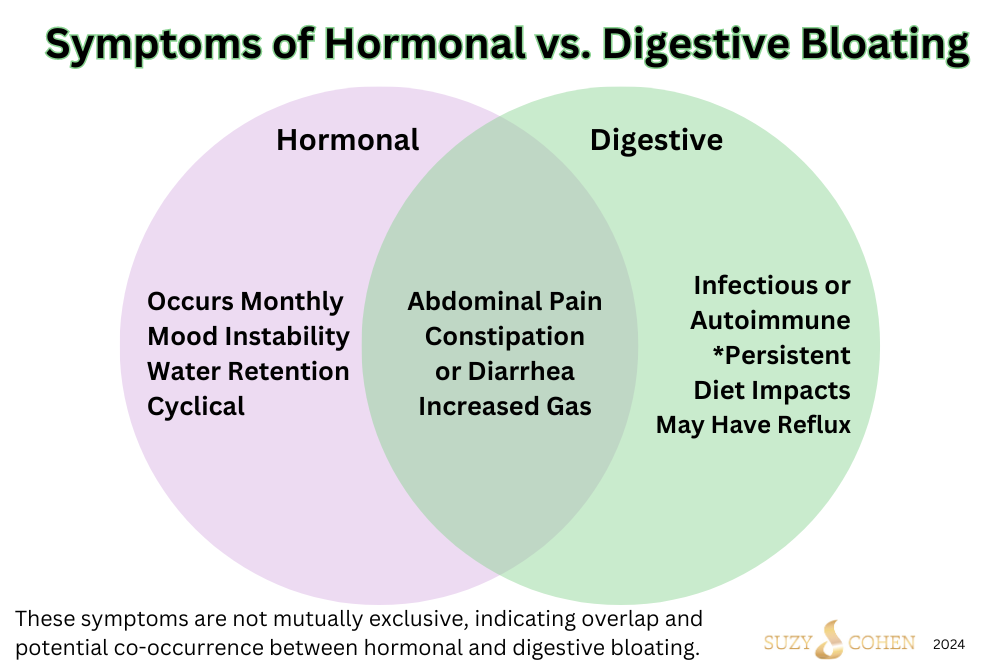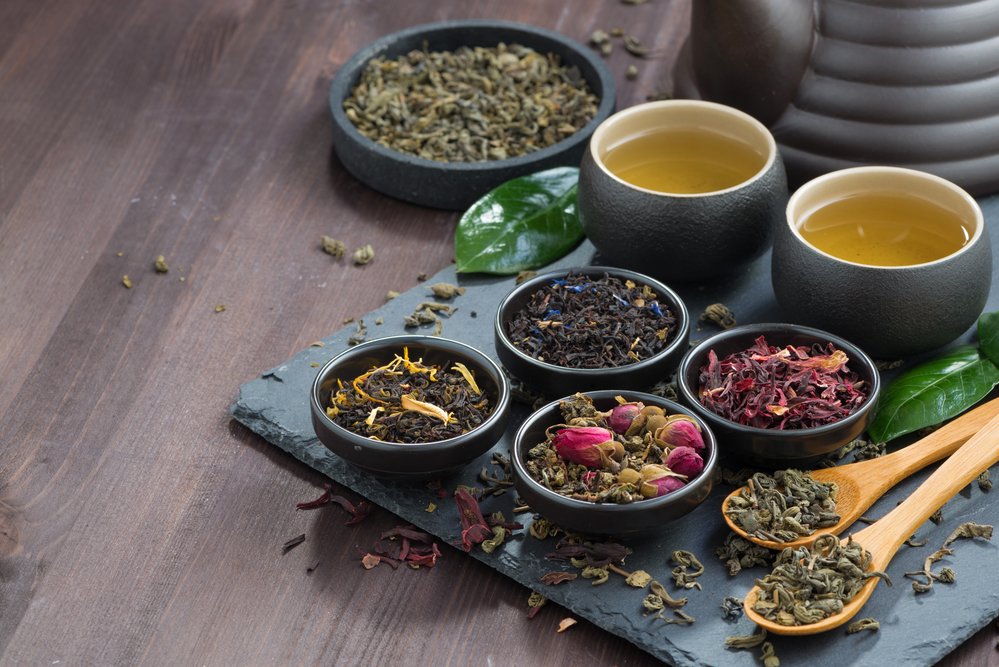What's On This Page?
ToggleBloating can sneak up on you for a variety of reasons, whether it’s from indulging just a bit too much, rushing through your meals, diving into hard-to-digest foods like beans, cauliflower rice and broccoli, sipping carbonated drinks, or even just from swallowing air inadvertently. It happens to all of us.
But we also see more serious cases of persistent bloating – like at every meal or so. So we can’t overlook more chronic underlying gut troubles such as irritable bowel syndrome (IBS), Crohn’s or functional dyspepsia, which can add to the discomfort.
Sorting out the root cause of bloating, especially when it tags along with indigestion or the burning pangs of heartburn, isn’t always straightforward. The topic of my blog today is more about hormonal bloating, not so much digestive bloating but you still need to be able to tell the difference in order to get proper treatment. So I made a picture for you that’s pretty basic, but still helpful.

Dyspepsia, or what you might call indigestion, can stir up a host of symptoms including stomach discomfort, bloating, nausea, and feeling full too soon after starting a meal, typically triggered by specific foods or overeating. It can also occur from food poisoning, fungal, parasitic or bacterial infection, or autoimmune related.
Heartburn, or acid reflux, involves stomach acid sneaking back up into your esophagus, which can create a host of unpleasant sensations like a burning chest, regurgitation, and a sour taste lingering in your mouth. You can read my blog, Navigating The World Of Antacids: From Traditional To 5 Natural Remedies.
Medications
When these symptoms persist, it might be time to consider a pharmaceutical approach such as an H2 antagonist (famotidine), or maybe even a proton pump inhibitor (PPI) like omeprazole, which can help reduce stomach acid and provide relief from the discomfort associated with acid reflux and possibly alleviate associated bloating. These I only recommend as temporary. They are not intended as “forever” like many practitioners suggest. Read my blog here because I have been sounding the alarm for many years on these: Dangerous Drug Mugging Effect By Acid Blockers.
A good time to say to always consult your healthcare practitioner or GI specialist before starting any new GI medication to ensure it’s the right choice for you. Many of those (long-term or high doses) can cause cramps, heart arrhythmias, spasms and depression due to the depletion of nutrients from the body – something I call DRUG MUGGING. It has a 4.7 review status on Amazon which is really hard to get! I’m so proud of this book which has helped hundreds of thousands of people feel better on the meds they have to take.
You may be interested in another article I wrote entitled, What Your Doctor Should Have Ordered Instead Of Those Drugs!
Now let’s get to the meat of my blog today which has to do with bloating that is related to hormones. It’s a big deal for many men and women due to the fact that it could be overlooked, and then you are treated for digestive bloating (which requires a whole other strategy).
The Hormonal Roller Coaster
Experiencing bloating before your period can feel like you’re ready to float away like a balloon, and you’re certainly not alone in this! Around 70% of women report premenstrual bloating as a common symptom. Let’s unpack why this happens and how you can naturally ease the discomfort.
Hormonal fluctuations play a significant role in premenstrual bloating. During your menstrual cycle, estrogen and progesterone levels rise and fall, affecting your body in various ways. In the first half of your cycle, rising estrogen levels contribute to water retention. Post-ovulation, an increase in progesterone slows the digestive system, sometimes causing constipation and, consequently, more bloating. Just before your period, a drop in these hormone levels triggers further water retention.
Below we will discuss natural remedies to reduce bloating and water retention. Feel free to scroll down to that right now. But if you want to know whether it’s high or low progesterone (or testosterone, cortisol) stick with me and read this next section.
The Role of Hormone Testing in Managing Bloating
To further personalize your approach to alleviating premenstrual bloating, considering hormone testing could be invaluable. Understanding your specific hormonal imbalances—whether it’s progesterone, cortisol, testosterone, or estrogen—can illuminate why you might be experiencing more severe bloating and help tailor interventions that are more effective for your body.
Types of Hormone Testing
- Saliva Testing: Saliva testing is non-invasive and can be conveniently done at home. It measures the levels of free hormones, which are the active forms available for use by your body’s tissues. This type of testing is particularly useful for assessing cortisol rhythms over the day, which can influence bloating.
- Blood Testing: This is a common method for assessing hormone levels, offering precise measurements for both bound and free hormone levels. Blood tests can provide a snapshot of hormones that influence water retention and digestive functions linked to bloating.
- Urine Metabolite Testing: The DUTCH Complete Test Kit, available on our website, offers a comprehensive view of hormone production and their metabolites from a 24-hour urine sample. This test provides insights into how your body processes hormones, which could affect bloating, especially related to estrogen and progesterone levels. Take a few minutes to read the following article to learn specific pros and cons.
The DUTCH Complete Test – #1 Guide To Hormone Testing
Hormonal Imbalances and Bloating
- High or Low Progesterone: Progesterone helps regulate fluid balance in the body. Low levels can lead to increased water retention and bloating, whereas high levels might slow down your digestive system, leading to constipation and subsequent bloating.
- High or Low Cortisol: Known as the stress hormone, cortisol can influence fluid retention and fat distribution, which can exacerbate bloating. An imbalance in your cortisol rhythm (either too high, particularly at night, or too low) can impact digestive function and bloating.
- High or Low Testosterone: Though typically associated with male health, testosterone imbalances in women can affect body composition and fluid balance, influencing bloating.
- High or Low Estrogen: Estrogen directly impacts fluid and salt retention in the body. High levels can cause your body to retain more water, leading to increased bloating, while low levels can disrupt the balance and function of the gastrointestinal tract, potentially causing bloating.
Each testing method (saliva vs. urine vs. blood) has its pros and cons, and some work better depending on the route of administration of the hormone you take. Understanding these nuances enables you to choose the best approach for deciphering your hormonal health. By identifying specific hormonal imbalances, you can more effectively target and manage symptoms like bloating with tailored dietary, lifestyle, and supplement interventions. If you’re struggling with bloating and suspect hormones might play a role, consider exploring these testing options to better understand your body and enhance your overall well-being.
Not To Frighten – But Cancer is Possible
Persistent bloating can sometimes be more than just an annoying symptom, and I don’t want to frighten anyone. But I also would be remiss if I didn’t at least mention that persistent, chronic bloating (that doesn’t clear up with medications or remedies) should be investigated further. This is because new studies have shown it *may* be one of those first subtle warning signs of ovarian or other pelvic cancers. It is almost always NOT cancer, but again, I need to mention it for the sake of completeness, and for those of you with persistent symptoms. For ovarian cancer, again, this type of bloating doesn’t usually clear up with your usual diet tweaks or quick-fix remedies.
When considering ovarian or other pelvic cancers, there are additional signs along with bloating:
- Pelvic or abdominal discomfort: A frequent, nagging pain in your lower abdomen or pelvic area.
- Changes in bathroom habits: This might mean you’re running to the bathroom more often or feel an urgent need to go.
- Feeling full quickly: You might notice you’re barely into your meal and already you feel stuffed. It’s called early satiety.
- Bowel changes: Watch out for shifts like constipation that just don’t feel normal.
- Unexpected weight changes: This could be losing or sometimes even gaining weight without trying.
- Menstrual irregularities: Any unusual changes in your cycle, especially if they’re not linked to menopause.
If you’re dealing with bloating along with any of these symptoms and they’re new, persistent, and out of the ordinary for you, it’s crucial to get in touch with your healthcare provider. They can run the necessary tests to pinpoint the cause. Catching things early is especially key with conditions like ovarian cancer, which often doesn’t show clear signs until it’s quite advanced. Let’s talk about something better like teas now.
Herbal Teas May Help

Make an Herbal Tea
Sipping on herbal teas is a comforting and effective way to alleviate bloating. Herbs like peppermint, ginger, and chamomile are renowned for their anti-inflammatory properties and their ability to soothe the digestive system. Here’s a simple recipe you can try at home to harness these benefits using these 3 herbs.
Soothing Herbal Tea Blend Recipe
Ingredients:
- 1 teaspoon dried peppermint leaves
- 1 teaspoon dried chamomile flowers
- ½ teaspoon grated fresh ginger root
- Optional: fennel
Instructions:
- Boil Water: Start by boiling 2 cups of water in a small pot.
- Add Herbs: Add the peppermint, chamomile, and ginger to a tea infuser or directly into the pot.
- Steep: Cover and let the herbs steep for 5-10 minutes, depending on how strong you like your tea. The longer it steeps, the more potent the anti-inflammatory effects.
- Strain and Serve: If you’ve added the herbs directly, strain the tea into your favorite mug. Otherwise, remove the infuser.
- Optional: Sweeten with a teaspoon of honey or a slice of lemon for added flavor and digestive benefits. Honey has pollen in it, did you know this can trigger mast cell release of histamine? Read this article, The Best Honey For Allergies: Raw Unfiltered Vs. Pasteurized Comparison.
This herbal tea blend not only helps reduce premenstrual bloating but also calms the mind and body, making it a perfect drink to enjoy any time of the day. Do you like tea? Down below if you scroll, you’ll find another herbal tea blend for bloating discomfort that utilizes lemons.
Natural Remedies to Reduce Bloating
Hydration is key. Drinking ample water can help minimize water retention. Diet-wise, reducing salt intake and adding potassium-rich foods like bananas and spinach can balance sodium levels and decrease bloating. Steer clear of carbonated drinks, which can exacerbate gas and bloating. Regular exercise also supports digestive health and reduces water retention.

Supplements and Beyond
If lifestyle adjustments don’t cut it, magnesium supplements might be beneficial. A study highlighted by the Journal of Women’s Health found that magnesium combined with vitamin B6 could significantly ease premenstrual symptoms, including depression, anxiety and bloating.*
See the STUDY here. For those needing something stronger for immediate bloat relieve, diuretics or over-the-counter remedies like Midol can offer relief, but it’s wise to use these under medical advice due to potential side effects. Also, to clarify, unlike B6 and magnesium, Midol will not have a benefit for anxiety.
Recent Insights on PMS and Diet
Anyone who’s ever had a period can confirm what the million-dollar studies prove and that’s that cravings for sweet, salty, and fatty treats like chocolate, pastries, fries and other snacks tend to spike during that time of the month! Here’s a 2018 PAPER that you can chew on to learn more.
Emerging research suggests that eating an anti-inflammatory diet rich in fruits, vegetables, and omega-3 fatty acids might lessen premenstrual bloating. Additionally, supporting gut health with probiotics, found in foods like yogurt, may also mitigate symptoms through the production of B12 and B6 (which we already know helps with the mood swings, see study above).
Probiotics in your gut can produce small amounts of vitamin B12 and B6, though typically not enough to cover your daily needs. Including a balanced diet and following your healthcare provider’s guidance ensures you get enough of these essential nutrients.
For Severe Cases
In instances of severe premenstrual bloating, medications such as SPIRONOLACTONE or oral contraceptives might be necessary but should always be used under a healthcare provider’s guidance.

Lemon Ginger Tea: A Natural Remedy for Bloating
Lemon ginger tea is not just a soothing and flavorful beverage; it’s also an effective natural remedy for bloating. This tea combines the benefits of both lemon and ginger, each known for their digestive health properties, making it an excellent choice for those looking to ease abdominal discomfort. Here’s how each ingredient contributes to reducing bloating:
Lemon
- Digestive Aid: Lemon stimulates the production of stomach acid and digestive enzymes, enhancing the digestion process and reducing bloating.
- Diuretic Properties: Lemon helps the body expel excess salt and fluids, alleviating water retention and bloating.
- Potassium Rich: High levels of potassium in lemons help balance sodium levels in the body, crucial for managing fluid retention.
Ginger
- Anti-inflammatory: Ginger contains gingerols, which are anti-inflammatory compounds that can help reduce swelling and inflammation in the digestive tract, thus easing bloating.
- Digestive Stimulant: Ginger enhances gastric motility, which helps in moving food through the gastrointestinal tract more smoothly, preventing the build-up of gas and bloating.
- Nausea Relief: Often used to treat nausea, ginger can also soothe an upset stomach, further reducing discomfort associated with bloating.
Making Lemon Ginger Tea
To make lemon ginger tea, all you have to do is:
- Boil a cup of water.
- Add a slice of fresh ginger root (about one inch) to the water and let it simmer for 5 minutes.
- Remove from heat and add fresh lemon juice from half a lemon.
- Optional: Add a teaspoon of honey for sweetness if desired.
- Strain and enjoy warm.
Starting your day with a cup of lemon ginger tea can stimulate your digestive system, help manage water retention, and support overall digestive health, making it a potent natural remedy for bloating. This tea not only provides relief but also offers a refreshing start to your morning or a calming addition to your evening routine. Here’s my other article with 12 easy, simple delicious recipes for relaxing teas. You may find a recipe you love. SKIM THIS if you have a moment.
Conclusion
Premenstrual bloating, while frustrating, can be managed through understanding hormonal dynamics and implementing natural and practical remedies. Even teas and herbal remedies are helpful to some.
Telling the difference between If bloating is severe or persistent, consulting a healthcare provider is essential. By staying hydrated, eating well, and listening to your body, you can significantly improve how you feel each month . Here’s to embracing better days, regardless of the time of the month!

Suzy Cohen, has been a licensed pharmacist for over 30 years and believes the best approach to chronic illness is a combination of natural medicine and conventional. She founded her own dietary supplement company specializing in custom-formulas, some of which have patents. With a special focus on functional medicine, thyroid health and drug nutrient depletion, Suzy is the author of several related books including Thyroid Healthy, Drug Muggers, Diabetes Without Drugs, and a nationally syndicated column.



